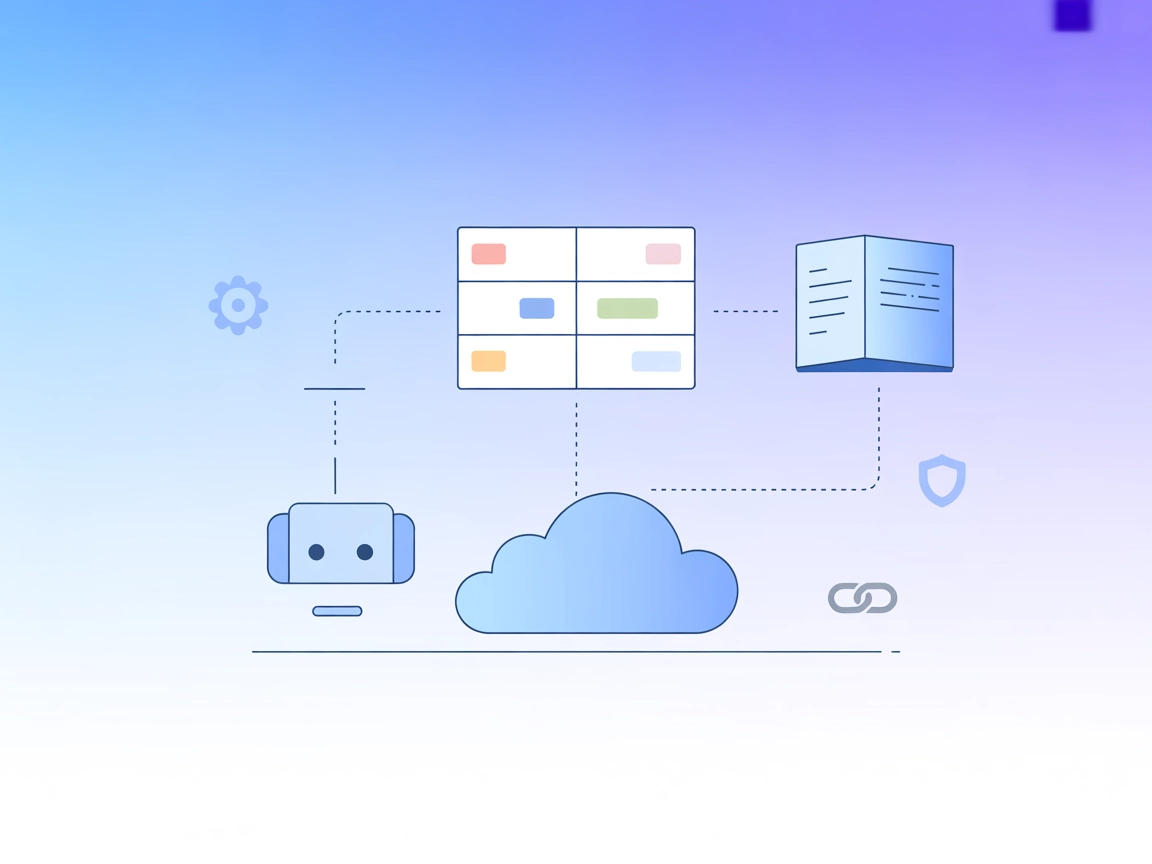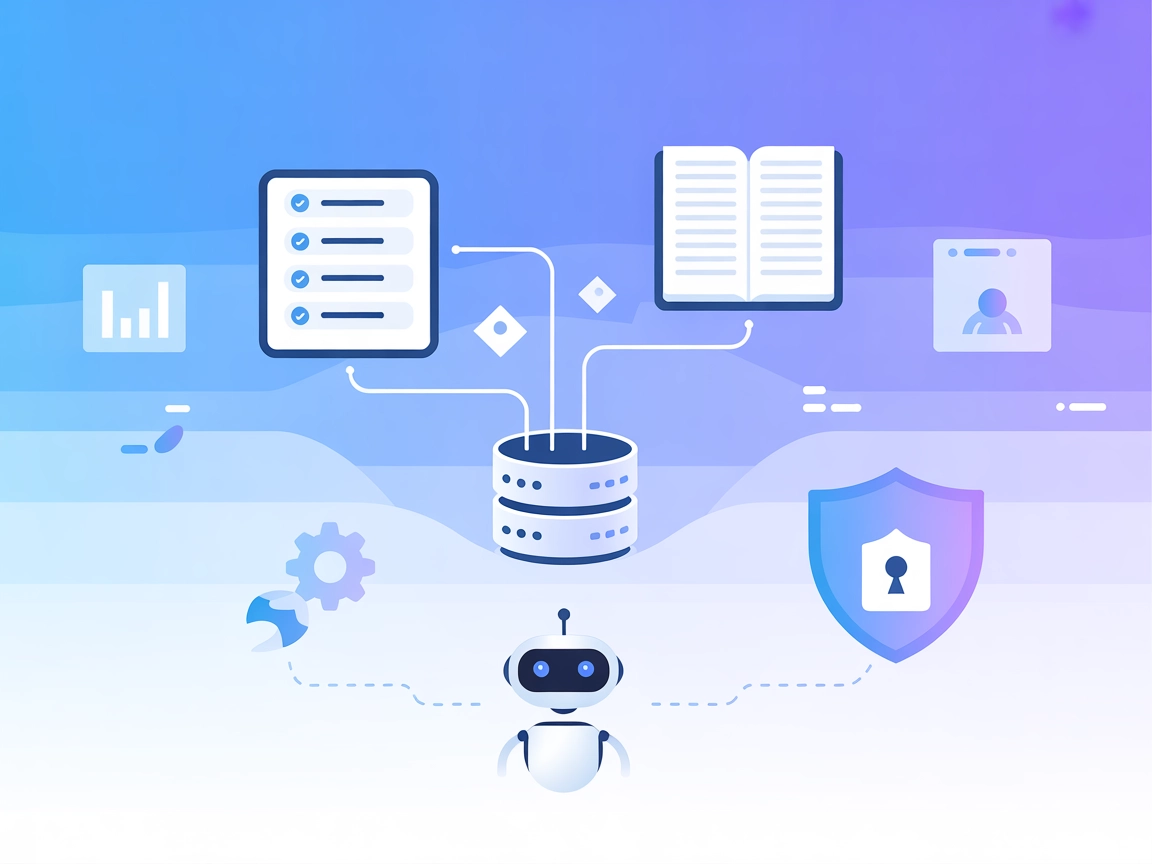
Atlassian MCP Server Integration
The Atlassian MCP Server bridges AI assistants with Atlassian tools like Jira and Confluence, enabling automated project management, documentation retrieval, an...

Connect Jira and Confluence to your AI workflows with the Atlassian MCP Server for streamlined, automated project management in FlowHunt.
FlowHunt provides an additional security layer between your internal systems and AI tools, giving you granular control over which tools are accessible from your MCP servers. MCP servers hosted in our infrastructure can be seamlessly integrated with FlowHunt's chatbot as well as popular AI platforms like ChatGPT, Claude, and various AI editors.
The Atlassian MCP Server connects AI assistants with Atlassian’s popular project management tools—Jira and Confluence. Acting as a bridge between AI models and these platforms, it enables automated and intelligent workflows for smart project management. By exposing Jira and Confluence’s data and actions via the Model Context Protocol (MCP), this server empowers AI to interact with tasks, tickets, documentation, and project resources. This allows AI-powered assistants to retrieve, update, and manage project information, automate repetitive tasks, and provide contextual insights—streamlining developer and team productivity by embedding AI deeply into project management operations.
No prompt templates are mentioned in the repository or its documentation.
No explicit MCP resources are documented in the repository or visible documentation.
No explicit tool list is provided in the repository overview or documentation. Code navigation is required for a detailed tool list, but it is not provided in the visible documentation or README.
{
"mcpServers": {
"atlassian": {
"command": "npx",
"args": ["@phuc-nt/mcp-atlassian-server@latest"]
}
}
}
{
"mcpServers": {
"atlassian": {
"command": "npx",
"args": ["@phuc-nt/mcp-atlassian-server@latest"]
}
}
}
{
"mcpServers": {
"atlassian": {
"command": "npx",
"args": ["@phuc-nt/mcp-atlassian-server@latest"]
}
}
}
{
"mcpServers": {
"atlassian": {
"command": "npx",
"args": ["@phuc-nt/mcp-atlassian-server@latest"]
}
}
}
Securing API Keys (Environment Variables Example):
To securely manage your Atlassian credentials, use environment variables (e.g., in a .env file):
ATLASSIAN_API_KEY=your_api_key_here
JIRA_DOMAIN=your_jira_domain
CONFLUENCE_DOMAIN=your_confluence_domain
Example JSON reference (showing env usage):
{
"mcpServers": {
"atlassian": {
"command": "npx",
"args": ["@phuc-nt/mcp-atlassian-server@latest"],
"env": {
"ATLASSIAN_API_KEY": "${ATLASSIAN_API_KEY}",
"JIRA_DOMAIN": "${JIRA_DOMAIN}",
"CONFLUENCE_DOMAIN": "${CONFLUENCE_DOMAIN}"
}
}
}
}
Using MCP in FlowHunt
To integrate MCP servers into your FlowHunt workflow, start by adding the MCP component to your flow and connecting it to your AI agent:

Click on the MCP component to open the configuration panel. In the system MCP configuration section, insert your MCP server details using this JSON format:
{ “MCP-name”: { “transport”: “streamable_http”, “url”: “https://yourmcpserver.example/pathtothemcp/url" } }
Once configured, the AI agent is now able to use this MCP as a tool with access to all its functions and capabilities. Remember to change “MCP-name” to whatever the actual name of your MCP server is (e.g., “github-mcp”, “weather-api”, etc.) and replace the URL with your own MCP server URL.
| Section | Availability | Details/Notes |
|---|---|---|
| Overview | ✅ | Jira & Confluence integration for AI assistants |
| List of Prompts | ⛔ | No prompt templates found |
| List of Resources | ⛔ | No explicit MCP resources documented |
| List of Tools | ⛔ | No explicit tools listed in documentation |
| Securing API Keys | ✅ | .env.example provided for API keys/configuration |
| Sampling Support (less important in evaluation) | ⛔ | Not mentioned in the documentation |
| Supports Roots | ⛔ | Not mentioned in the documentation |
Based on the available documentation, the Atlassian MCP Server provides core integration with Jira and Confluence but lacks detailed public documentation on prompts, resources, and tools. The existence of a MIT license, setup guidance, and real-world use cases are positives, but the absence of deeper protocol and tool specifics holds back a higher rating.
Overall, this MCP server scores moderately well for basic integration and practical use cases but would benefit from improved documentation on MCP-specific features like prompts, resources, tools, roots, and sampling.
| Has a LICENSE | ✅ (MIT) |
|---|---|
| Has at least one tool | ⛔ |
| Number of Forks | 10 |
| Number of Stars | 31 |
The Atlassian MCP Server connects AI assistants with Jira and Confluence, enabling automation and intelligent workflows. It allows AI to retrieve, update, and manage project information, automate repetitive tasks, and provide contextual insights for enhanced productivity.
Typical use cases include Jira ticket management, Confluence documentation retrieval, automated project reporting, workflow automation (like ticket assignment or status updates), and providing developers with up-to-date project context.
Add the Atlassian MCP Server to your platform’s MCP configuration (such as Windsurf, Claude, Cursor, or Cline). Make sure Node.js is installed and follow the provided JSON snippets. Secure your API keys using environment variables.
API credentials should be managed using environment variables (e.g., in a .env file). Reference these variables in your MCP configuration to keep sensitive data out of source code.
Currently, there are no prompt templates, explicit MCP resources, or tool lists provided in the public documentation for the Atlassian MCP Server.
The Atlassian MCP Server uses the MIT license. It currently has 10 forks and 31 stars on its public repository.
Boost productivity by connecting Jira and Confluence to your FlowHunt AI flows. Automate reporting, manage tickets, and retrieve documentation effortlessly.

The Atlassian MCP Server bridges AI assistants with Atlassian tools like Jira and Confluence, enabling automated project management, documentation retrieval, an...

The Azure MCP Server enables seamless integration between AI agents and Azure's cloud ecosystem, allowing AI-powered automation, resource management, and workfl...

The Model Context Protocol (MCP) Server bridges AI assistants with external data sources, APIs, and services, enabling streamlined integration of complex workfl...
Cookie Consent
We use cookies to enhance your browsing experience and analyze our traffic. See our privacy policy.